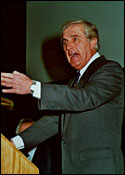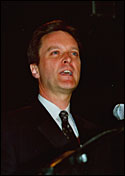Taking the pulse of health care
Taking the pulse of health care McGill University
User Tools (skip):
Taking the pulse of health care
Crisis? What crisis?
If the McGill Institute for the Study of Canada's recent conference on the state of Canada's health care system is any indication, not everybody agrees with the assessment of some of the country's premiers that medicare is almost on the verge of collapse.
Where there is consensus is in the notion that the health care system is under stress and needs some sort of re-jigging. But what sort?
 Roy Romanow
Roy RomanowPHOTO: Jack Goldsmith courtesy of the McGill Institute for the Study of Canada |
|
June Callwood, a journalist, author and health care activist, offered one prescription. She believes the system is in need of a heart transplant -- patients too often don't receive much respect or thoughtfulness from health care practitioners.
Callwood served on the board of directors at one hospital where she helped set up a program tailored to make patients feel more comfortable. "Staff were encouraged to smile, patients weren't woken up to take their medications, the wards smelled of freshly baked muffins and the patients were able to understand what their charts said."
According to Callwood, the patients in these wards tended to heal more quickly and required less medication for their pain. Policymakers rarely consider kindness as a goal for the health care system, Callwood noted ruefully.
Professor Robert G. Evans from the University of British Columbia's Centre for Health Services and Policy Research described much of the recent sombre talk about the unsustainability of Canada's health care system as "disinformation, misinformation and outright lies.
"This is a battle over who pays, who carries the can and who gets the privileges," Evans said, charging that Canada's elites want to recast the system to suit their own interests.
Evans said spending on doctors and hospitals as a percentage of our gross national product hasn't changed much in 25 years. The notion that costs are spiraling out of control is phony. "What is blowing up are drug costs."
If there is a public perception of a crisis, University of Toronto political scientist Carolyn Tuohy thinks she knows where it originates. It stems from the massive cuts made to the system in the mid-'90s as governments scrambled to reduce their deficits.
Spending on health care has since been increased, but those drastic cuts had an immense and lasting effect. "It was enormously disruptive to the system and to public confidence."
As a result of that shakeup, Tuohy believes the public is more receptive now to the prospect of major changes to the system. "The political risks of inaction now outweigh the risks of action."
Harvard management professor Ted Marmor has studied the Canadian health care system for over 25 years. He says Canadians don't need to panic.
"There is no crisis. What's really going on is an adjustment. From my position south of the border, I have to say I would be delighted to have to deal with your kind of 'crisis.'"
Like Tuohy, he suggested that many of health care's woes are tied to the big cuts of the '90s. And like Evans, Marmor thinks Canada's media hasn't done much to stir up informed debate about health care.
Marmor said he was stunned that the MISC had managed to convince both La Presse and The Globe and Mail to run a series of thoughtful op-eds about health care in the days leading up to the conference. Too often, the media presents a formulaic "he said, she said" version of the news with two opposing viewpoints and the assumption "that the truth lay somewhere in between," said Marmor. He criticized "the dire ignorance" of that approach and said the media did little to educate citizens about the issues involved in the administration of health care.
The man who might be thinking more about the health care system than anyone else in the country right now, Roy Romanow, also took part in the conference.
Romanow, the former premier of Saskatchewan and the head of the Royal Commission on the Future of Health Care in Canada, reiterated his central thesis. "The medicare home does not need demolition, it needs remodelling."
Romanow says Canadians are remarkably united in their strong support for the health care system. "Poll after poll confirms this."
But with an aging population and massive technological change to contend with, Romanow said the costs associated with the system are almost certain to rise dramatically.
One thing that won't help the health care system get any better anytime soon "is the corrosive long-distance hollering that passes for federal-provincial discourse in this country. It's a relationship that is badly dysfunctional," the former premier declared.
Romanow is troubled by recent remarks from Ontario premier Mike Harris and others stating that the provinces will have to devise their own individual solutions to health care problems. Romanow worried about the possibility of "10 health care systems" being created as a result.
He mused about the possibility of "care shopping" with Canadians moving to the provinces that offered the better health care services. The schisms between the have and have-not provinces would worsen.
"I know most Canadians implicitly recognize and reject the great risks this poses. This is no way to build a unified country."
University of Ottawa management professor Douglas Angus said that a five percent increase in the costs of health care wouldn't necessarily be a bad thing. "If it leads to a five percent improvement in the health of Canadians, then it's a justifiable cost."
Angus believes that European countries do a better job of analyzing the effectiveness of their health care systems. North Americans look at figures such as infant mortality and life expectancy -- important measurements to be sure, but not very subtle indicators of the quality of life our health care system is affording us. Europeans tend to be better at examining not just how long they're living, but how well they're living.
Health administration professor André-Pierre Contandriopoulos from the Université de Montréal said Canada ranks right in the middle of industrialized countries in terms of what it spends on health care.
He also noted that one element in the health care system was far outpacing everything else in terms of how quickly its costs were escalating -- drug treatments. There has been an 87% increase in the costs associated with drugs between 1980 and 1989.
Dr. Hugh Scott, executive director of the McGill University Health Centre, agreed with that assessment, jokingly counselling his audience to invest in pharmaceutical companies. Scott said when you look at spending on doctors and hospitals, by comparison, "there is evidence of control."
Is it the high costs of research and development that drives these rising drug costs? Scott isn't so sure. Using overheads, he examined the hiring patterns of drug companies. The pharmaceutical firms have been expanding the staff in their marketing departments far more dramatically than is the case for their R&D units, Scott noted.
Dr. Henry Haddad, director of the Canadian Medical Association, said that one group of health care's principal players, doctors, "aren't at the table" when policymakers make major changes to health care.
Doctors are working 70-hour weeks, even 100-hour weeks. They are burning out, says Haddad.
One thing he advises policymakers to do is to train and hire more doctors, pronto.
Richard Jock, head of the National Aboriginal Health Organization, referred to the recommendations of the Royal Commission on Aboriginal Peoples -- specifically, the call to train 10,000 First Nations people to become the sort of skilled health and social service professionals that native communities badly require.
Jock challenged medical schools to do more in terms of setting up programs for training aboriginal doctors. The Universities of Alberta and Manitoba have made moves on this front. "I see no reason why other educational institutions can't take this on as one of their premier challenges."
Jock noted that the medical and dental professions are wary of others stepping on their respective turfs. Doctors and dentists aren't enthusiastic about the rise of new professions such as nurse practitioners and dental therapists, professionals who are taking on some of the responsibilities that were once the exclusive domain of doctors and dentists.
Jock says these new professions hold promise for native communities that have had problems accessing the services of physicians and dentists. The services of a nurse practitioner might not be required for a native community located close to Montreal, but the view from another native community located 300 miles away from the nearest urban centre is quite different.
Dr. Ginette Lemire Rodger, director of the Canadian Nurses Association said the shortage of nurses in this country is bound to get worse. Five thousand nurses a year are graduating from nursing programs in the country. Canada would need double that number to contend with the number of nurses who are retiring.
Lemire Rodger stated that commission after commission -- led by the likes of Bégin, Hall, Fyke, Clair and Mazankowski -- has recommended that more support be directed to health promotion and community care. It hasn't happened and that has only worsened the impact of the drastic cuts to acute care in the mid-'90s.
Sharon Sholzberg-Gray, head of the Canadian Healthcare Association, says health care is all about making tough choices.
"We have to admit that we can't fund 100% of all services. Can we afford to clean the homes of every single person who is frail? Probably not."
But she wondered if we were funding all that we should be funding. Maybe the problem isn't entirely about escalating medical costs, Sholzberg-Gray mused. "Maybe its tax cuts that are out of control."
 Colin Hansen
Colin HansenPHOTO: Jack Goldsmith courtesy of the McGill Institute for the Study of Canada |
|
She said that there is a role for the private sector in health care. "The private sector isn't evil." She says private labs play a helpful role, for instance, in the way they manage diagnostic services and blood tests. But the private sector should continue to be limited in the role it plays. "I don't know how many volunteers would devote their time to privately run hospitals."
British Columbia's health minister Colin Hansen said "every province in the country is about to hit the wall" in terms of their ability to fund health care.
Health care spending has gone up, but to little effect, Hansen declared. Accessibility isn't being protected when no one ends up with access to quality care, he said.
"The more time we spend talking about whether the system is sustainable is less time that can be spent making the changes that are required in an orderly way.
"Canadians expect health care to pay for everything from brain surgery to aromatherapy," said Hansen. "What services do we truly need?"
He contrasted two hypothetical patients, each looking for surgery for a heel spur. In one case, the condition only prevents an otherwise vibrant older man from playing tennis. In the other, it seriously limits the life of an older woman who can't climb up her own stairs.
Should we treat both patients the same, wondered Hansen. Should society foot the bill in both cases?
One of the questions we'll all be facing in the years to come.

